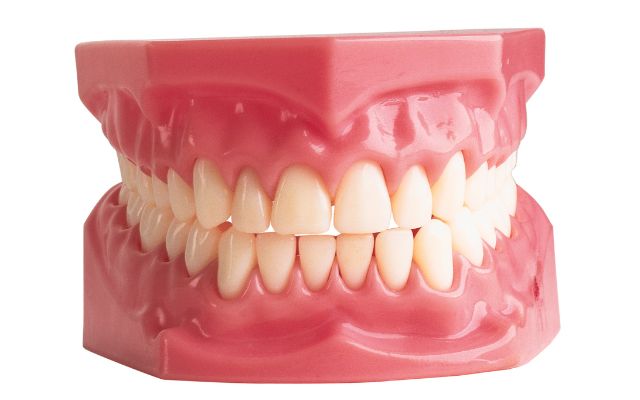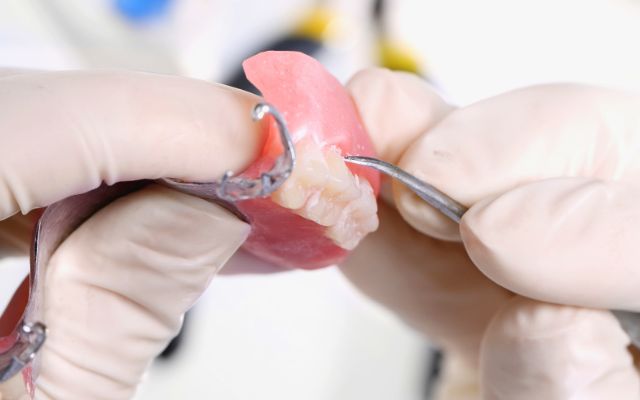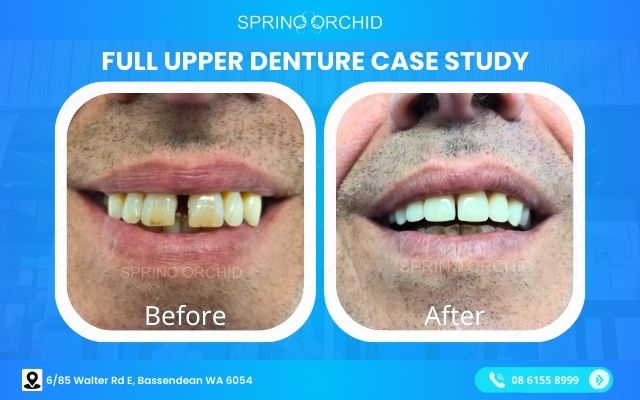Dentures
Dentures Bassendean
If you’ve lost some or all of your natural teeth due to decay, disease, or injury, dentures offer a practical and effective solution. At Spring Orchid Dental in Bassendean, we’ve helped many patients regain their confidence and smiles with our top-quality denture services. We provide a complimentary denture consultation to help you choose the right option for your needs, whether it’s full or partial dentures, repairs, or adding teeth to existing dentures. Using advanced technology, our experienced dentists ensure our dentures are both affordable and designed to look and feel natural.
Types of Dentures
Full dentures are another name for complete dentures. They are complete tooth replacements.
Before suggesting full options, most dentists will attempt to save at least few natural teeth. However, if all other treatments have been failed, complete dentures are usually required.


Dentures are constructed of acrylic resin and are supported only by hard and soft tissues that remain. They lack the stability of teeth that are fixed into the bone, such as implants or natural teeth.
With total dentures, many people suffer speech impairments. This is a result of the new prosthesis’s neuromuscular control of the mouth and cheeks and the thickness of the substance covering the palate. Significantly thinned acrylic will fracture over time.
Implant-supported bridges are another name for fixed partial dentures (FPD). FPDs use two dental implants to replace a few lost teeth in a row, with a prosthetic tooth or teeth filling in the spaces. They are screwed or permanently cemented into the mouth.
Patients with three or more consecutive lost teeth might consider implant-supported bridges. Implant-supported bridges cannot be removed, in contrast to removable partial dentures and removable full dentures.
RPDs (removable partial dentures) simply replace a few lost teeth in your upper or lower jaw. RPDs can be simply removed and changed at any time. They can return teeth to their normal appearance, feel, and function.
Any number of connectors, some of which are more aesthetically pleasing than others, can be used to attach a partial denture to your teeth, including metal clasps and frames.
They are frequently advised for those who do not qualify for an implant-supported bridge. People who are unable to have surgery are included.


Implant-retained dentures snap into a post that is inserted right into your jawbone, as opposed to traditional dentures that rest above the gum and are secured in place with cement. As a result, the denture is stable and stays in place.
No more applying adhesive is necessary if you have dentures anchored by dental implants. Additionally, because the implant post replaces a tooth root in your bone tissue, they aid in preventing jawbone erosion.
They are more stable and functional than traditional dentures. The only catch is that you have to take them out every night to clean and give your gum tissues a break.
Snap-on dentures, also known as implant-supported dentures, are one option for treating dental decay and tooth loss.
Snap-on dentures attach to surgically placed implants in your jawbone. They fit securely, allowing you to eat your favorite foods without fear of your dentures coming loose.
You must take off your appliance at night before bed if you use a snap-on denture.
What Makes Us Different?
Natural-Looking Smiles
Our dentures are designed to look like real teeth, giving you a beautiful, natural smile that only you and your dental prosthetist will know about.
Advanced Technology
We use state-of-the-art technology to create natural-looking dentures that restore your smile with confidence.
Personalised Care
We provide a complimentary consultation to tailor our denture services to your unique dental needs.
Affordable Solutions
We offer cost-effective options for full and partial dentures without compromising on quality or aesthetics.
Ready to Restore Your Smile?
Book your complimentary denture consultation today at Spring Orchid Dental! Our experienced team is here to guide you through every step, ensuring a comfortable, affordable solution that brings back your confidence.
Call Now (toll free)
08 6155 8999
Denture Procedure
Step 1: Dental Examination
We begin by examining the patient’s teeth and overall dental health. The dentist checks for any issues like tooth decay or previous dental work that might affect the denture process. Any teeth that need removal before getting dentures will also be identified.
Step 2: Creating the Dentures
After the consultation, the dentist takes measurements and impressions to ensure the dentures match your natural teeth. These are sent to a lab where the dentures are crafted using acrylic resin for a perfect fit and appearance.
Step 3: Denture Fitting
Once the dentures are ready, we’ll schedule a fitting. Your dentist will ensure they fit comfortably and make any adjustments needed for a pain-free experience.
Case Study
In this case study a 60 yo patient is presented with missing upper teeth and teeth mobilities due to advanced periodontitis where the roots no longer hold due to prolonged and untreated gum disease. The proposed solution calls for the removal of all upper front teeth and these be replaced with a full upper denture.
The specific requirement for the new full upper denture presents an interesting case both in terms of aiming to retain the features of the former teeth on the new denture, and to ensure its colour shade, selected at A3 to blend in with both existing teeth and able to withstand colour variations through the patient’s daily smoking and strong coffee habit.
As the patient’s natural teeth always had a small gap between his 2 front teeth, while missing teeth due to gum disease over the years has widened this to be a bigger 3mm gap for most of his adult life, the patient still wishes to retain a small gap, although smaller at 1.5mm between the same middle 2 teeth for the new denture.
The patient’s successful outcome was achieved through a collaborative process involving the dentist, patient, and dental lab. Each tooth’s form was carefully selected to blend seamlessly with the patient’s natural teeth, with color shades promptly verified and adjusted as needed throughout the process for the final denture.


Secure Your Smile with Our Dentures Bassendean
6/85 Walter Rd E Bassendean WA 6054
FAQs
Periodontal disease can hasten bone loss, and when you lose teeth, the remaining bone may be insufficient. Because of this, wearing dentures might not be the best experience. Anatomy and function may have changed for anyone who has had reconstructive surgery after having oral cancer.
It’s typical to suffer slight irritation when you initially get your new dentures, but this should lessen as your mouth adjusts to them. The duration of the pain varies. It could take longer if you have new dentures after previously wearing a set.
Wearing dentures in your sleep, regardless of the type, is a bad decision that will lead to a variety of health problems in the future. Make careful to take out your dentures each night before bed to prevent oral bacteria buildup, keep a healthy gums, and maintain the strength and integrity of your bones.
Dentures should be worn for at least 8 hours per day. This will allow your jawbone and gums time to adjust to the dentures and stop sore spots from forming.
- Dentures should be cleaned at least twice a day.
- Changing your lifestyle can help you prevent staining your dentures.
- A nighttime care routine is required.
- There is a correct method for washing dentures.
- Some products can cause dentures to break.




